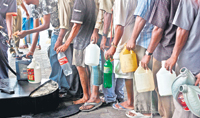|
Business, motorists slam government, unions over fuel strike
The business community and motorists slammed trade unions at the Ceylon Petroleum Corporation (CPC) for resorting to a two-day strike last week that crippled fuel supplies, saying the country shouldn’t be held to ransom by unions and that the government shouldn’t have wilted under pressure.
“These (strikers) are traitors to the nation. They can’t hold the country to ransom,” one angry motorist said while waiting for his turn in a long queue outside a fuel station in Colombo. The strike was called off after assurances to the unions that their demands would be favourably considered within two weeks. Nimal Perera, Chairman of the Ceylon National Chamber of Industries, urged President Mahinda Rajapaksa to deal with CPC strikers firmly and “in the event that they continue their strike action to evict them and deploy the armed forces to bring normalcy to the Corporation.” His letter (see later text) to the President was issued a few hours before the strike was called off late on Tuesday but Perera’s request was a clear message from the business sector that the country cannot be held to ransom by a group of people. Long lines of motorists were still seen on Wednesday morning as empty fuel stations awaited their supply from the CPC.
“If the government submits to the workers' demands there will be more sectors resorting to trade union action thereafter crippling the entire economy and totally destabilizing the country,” Perera warned as trade unions flexed their muscles on other issues like salary anomalies and the current negotiations on a fresh wage structure for plantation workers. He also requested an appointment with the President to discuss many urgent matters currently affecting the economic activities of the country and day to day life of the people. The crisis came a week after the government also gave into strikers at the Colombo Port who demanded increased wages and benefits. Deva Rodrigo, the outgoing Ceylon Chamber of Commerce chairman, said crises like this in essential sectors like the ports and fuel are unfortunate. “It also shows that essential sectors that continue to be state-managed and state-controlled don’t necessarily mean the people benefit – in the crises we have seen in two weeks.” He said for example trade unions won’t be able to cripple the telecom industry now compared to when it was a state monopoly. “There are many telecom firms now,” Rodrigo said. Angry motorists also clashed with police at Panchikawatte last week following allegations that fuel pump attendants were giving priority to police vehicles while a long line of motorists waited patiently for their turn. The strike was over the appointment of a new chairman at the Ceylon Petroleum Storage Terminal Ltd (CPSTL) and fears by workers that plans were underway to divest the CPSTL to the private sector. Some years back the CPC was broken into three entities with one part being sold to Lanka Indian Oil Corporation (LIOC), taking over some 40 percent of CPC fuel sheds and another company (CPSTL) being formed with the CPC, LIOC and the Sri Lanka Treasury having equal shares. Meanwhile K. Ramakrishna, Managing Director of LIOC said a second shipment of fuel was expected on August 4-5 in Colombo to supply most of the LIOC’s empty sheds. Asked about the progress of the tripartite agreement between the LIOC, CPC and the government, he said it was expected to be finalised by the end of the month, adding that they now expected regular refined fuel shipments, each sufficient for a month’s supply. He dismissed reports of the government planning to take over the Trincomalee Oil tank farm which was handed over the LIOC during the privatization process. “These reports are baseless. We have an agreement with the government and we have spent $20 million on upgrades of 16 tanks while incurring a lot more on recurring costs,” he added. Perera’s letter: The Colombo Port strike which lasted for 10 days not only cost the country millions of rupees but the long lasting repercussion to the economy due to serious impediments the exporters and importers had to face would have severe negative effects on the economy. The strike action by the workers of Ceylon Petroleum Corporation who are holding the whole country to ransom would compound the adverse effects and the damage sustained to the economy by the Port strike. If the published reason for the Ceylon Petroleum Corporation strike is the appointment of a Chairman made by yourself (President) it is needless to say that the trade unions today could even dictate terms to the Executive President democratically elected by the people. We believe that godfathers of these mischief-making trade union leaders are in the government ranks as well which makes the situation even worse. Strike action after action by government and government corporation employees of key installations could even be a deliberate attempt to destabilise the government. We believe that if the government submits to Ceylon Petroleum Corporation workers demands there will be more sectors resorting to trade union action thereafter crippling the entire economy and totally destabilising the country. We as responsible members of the private sector urge you to deal with these Ceylon Petroleum Corporation strikers firmly and in the event that they continue their strike action to evict them and deploy the armed forces to bring normalcy to Ceylon Petroleum Corporation.” |
||||
Copyright © 2006 Wijeya Newspapers
Ltd. All rights reserved. |

